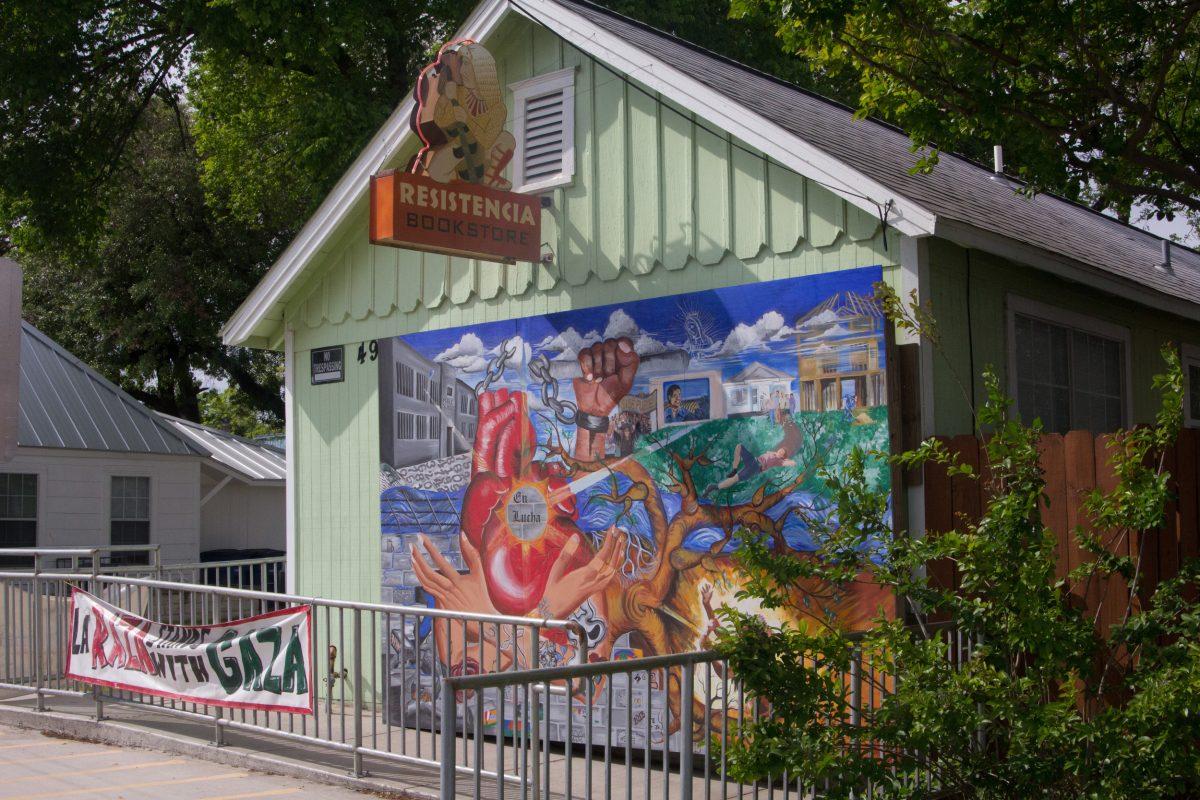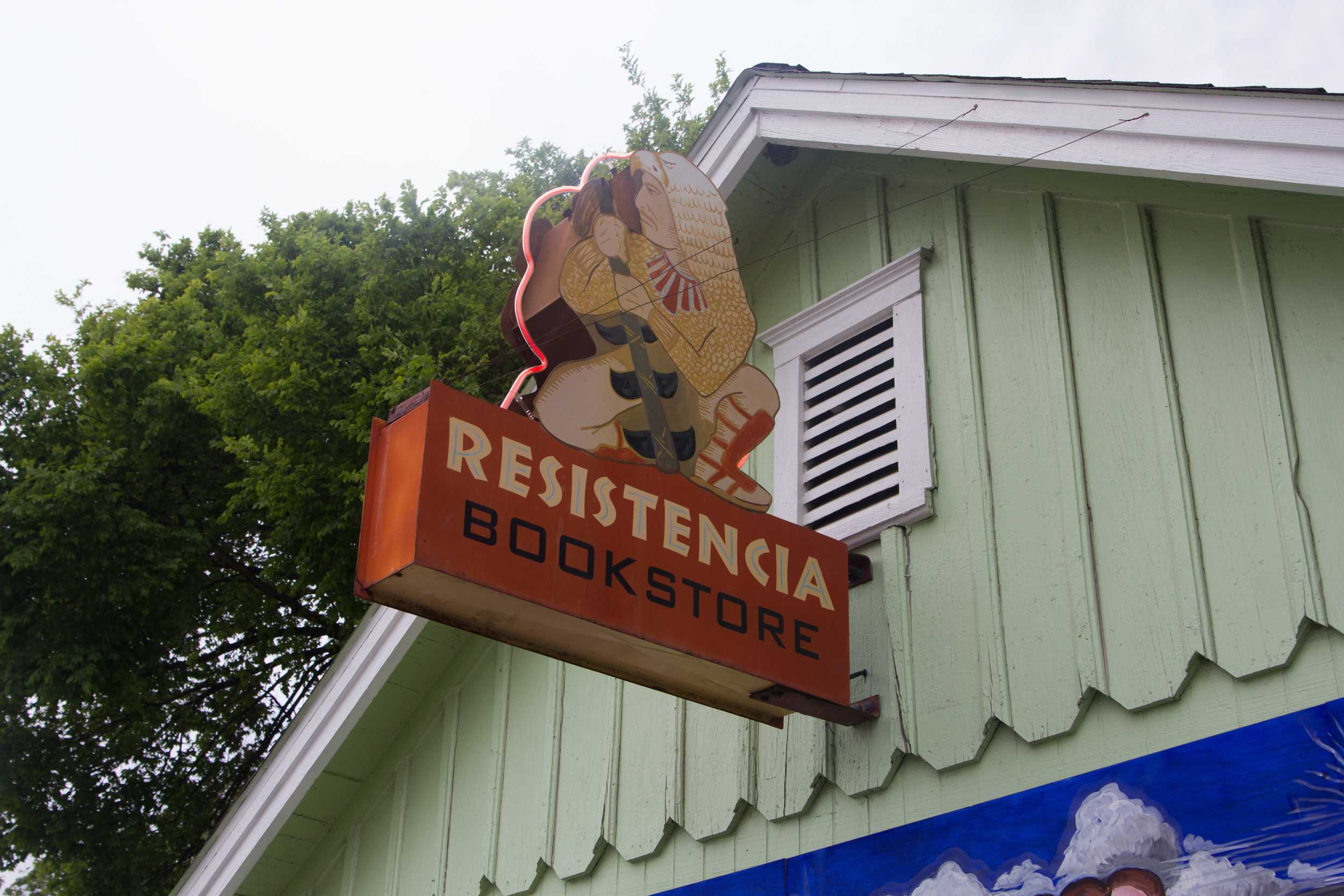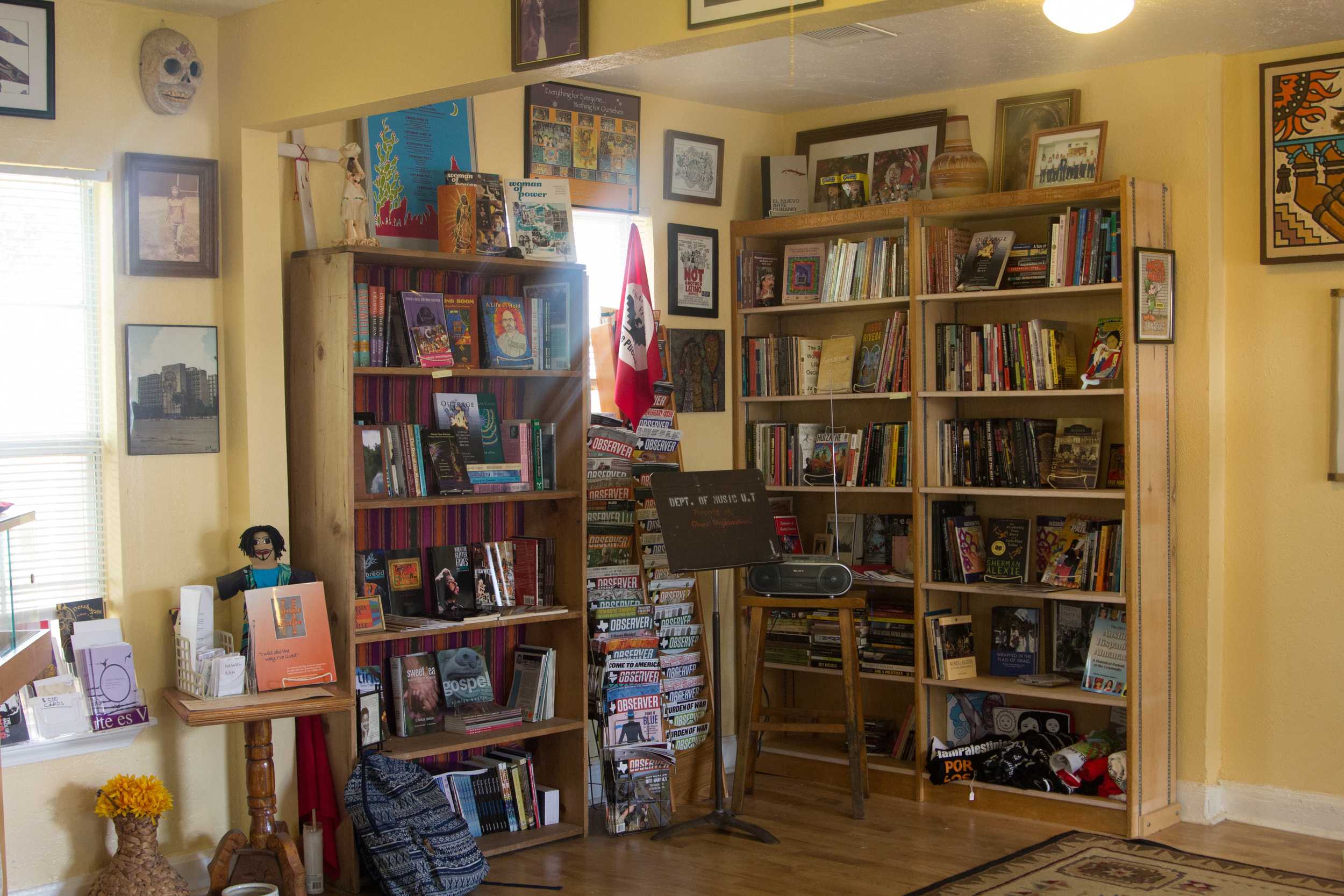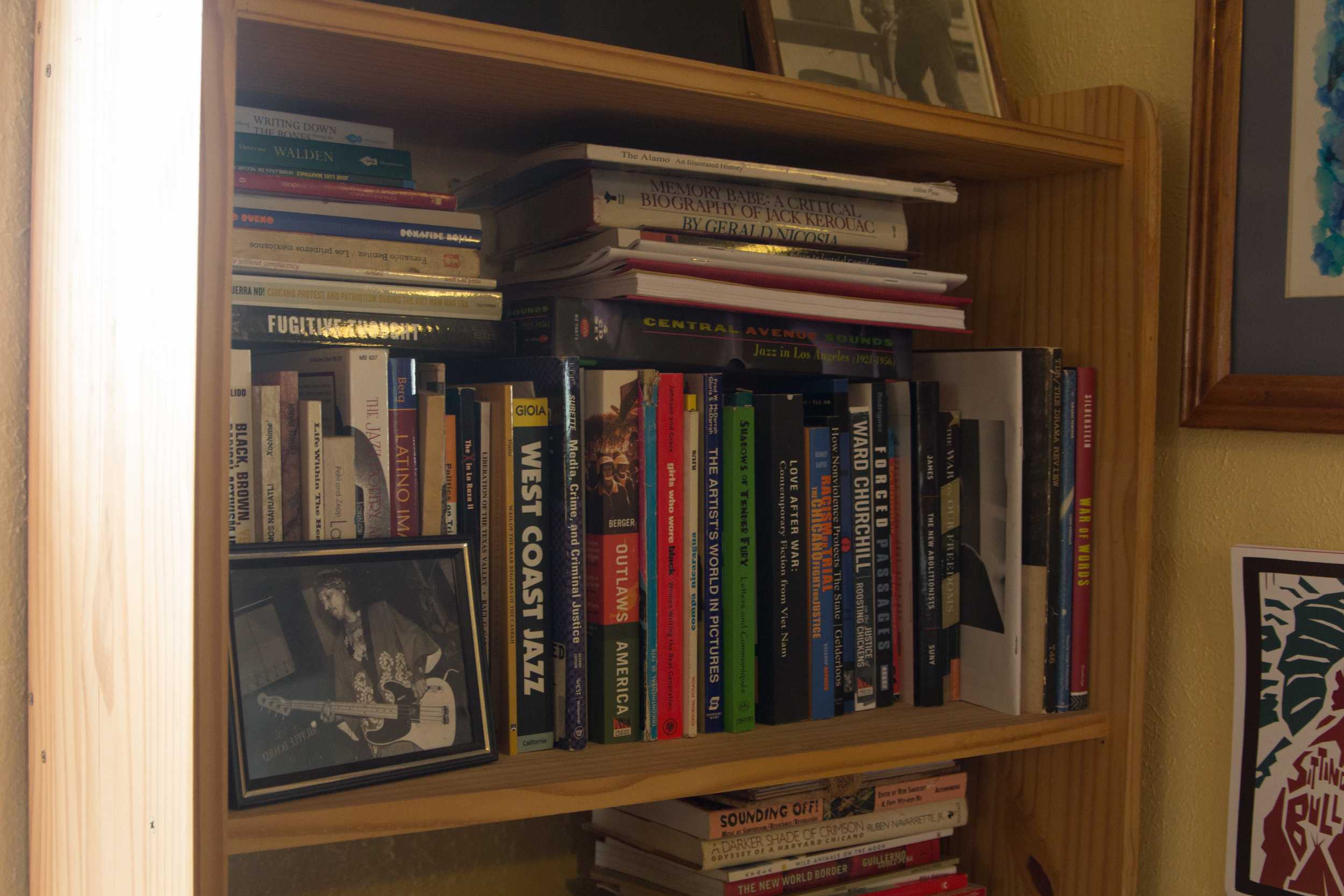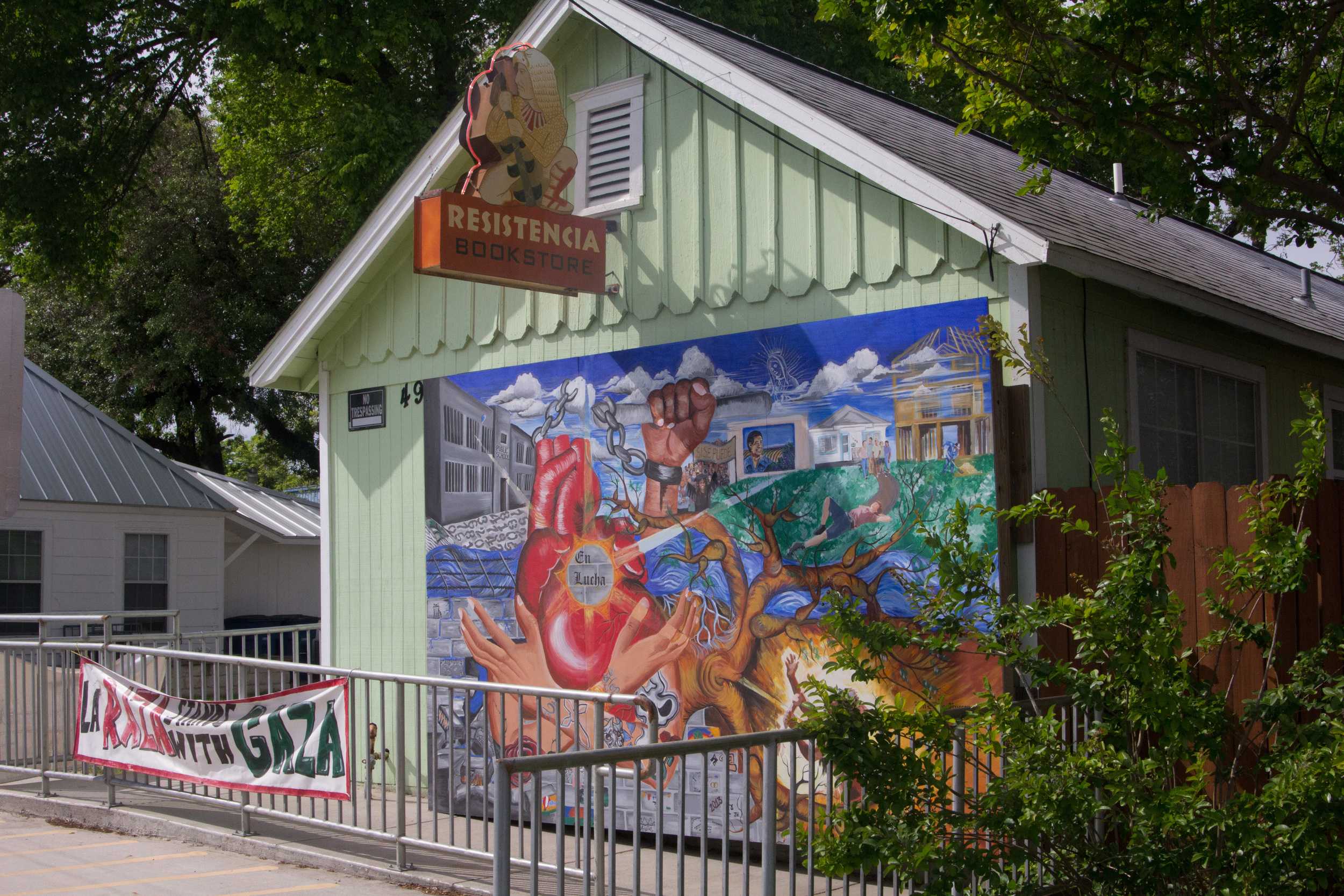Walking into Casa de Resistencia Books feels like walking into a friend’s living room.
Story by Jacqueline Ramos
Photos by Kristin Evans
Unique self-portraits and beautiful photos of indigenous people line the walls of the cozy shop, along with “Black Lives Matter and “Ayotzinapa” signs. You won’t be able to find the current New York Times best sellers here, but you can find an independently published book full of poems about living in East Austin, or a book about the liberation of minority communities.
Austin native Raúl Salinas opened Casa de Resistencia Books on East Sixth Street in 1981. He opened the bookstore when he returned to Austin after living in Seattle, Washington for many years. Salinas was incarcerated for over a decade on non-violent, drug related charges. During his time in prison, he became aware of social and political issues, which inspired him to write poetry and co-create two prison journals, Aztlan de Leavenworth and New Era Prison Magazine. He would go on to publish his poetry in the journals and gain recognition in and out of the penitentiary.
A couple of years after his release, Salinas began working at El Centro de la Raza, a community center for Chicanos and Latinos in Seattle. In the mid-seventies, Centro received more funding, and Salinas founded the first ever Resistencia Bookstore. Around this time, Salinas and other members of the community also created Presa Rescate, or Rescue Press, another safe space where Chicanos and Latinos were able to share their art, poetry and other creative works.
This open area of the bookstore is used for meetings and events.
After his time in Seattle, Salinas returned to Austin and moved Resistencia Books with him. He also created Red Salmon Arts, a cultural arts organization and press inspired by Presa Rescate. Red Salmon Arts still supports Resistencia Books today. Salinas would run both organizations until his death in 2008.
Resistencia Books and Red Salmon Arts were created by people who felt they could not express themselves in mainstream spaces.“Many activists, who were also often artists, believed that in order to create safe, empowering places, they needed to create spaces on their own, for themselves, on their own terms,” current Executive Director of Red Salmon Arts, Dr. Lilia Rosas says.
Resistencia is known for having a wide range of books, in comparison to other stores around town. Long time friend of Salinas and Board president of Red Salmon Arts, Gilberto Rivera, says the bookstore has always been an attempt to provide work that wouldn’t be found at regular bookstores.”You’re not going to find a lot of the stuff we have here at Book People or even at The University of Texas,” Rivera says. “These are writings of progressive people, gay and lesbian people, Chicanos, African Americans and so forth.”
A collection of works available in the store.
Rivera says they’re not ashamed of being progressive at Resistencia, and invite those who may not be able to express themselves freely at other places in town to stop by the store. “The bookstore is a really cool place because it brings together people that may not be able to do their book readings or their poetry in any other place in town,” Rivera says. “There are local places that would probably allow it but not as open as it is here.”
Although Casa de Resistencia has been in Austin for over 30 years, it has not been easy. With the influx of newcomers, Resistencia has been displaced and moved around at least four times. They were first located on East Sixth Street, moved to South First Street, where they stayed for 15 years, and are now on East Cesar Chavez Street. “Part of the survival of this place is that we move as we need to — we don’t do it haphazardly,” says Rosas. “We do it in the tradition of our ancestors, which were migratory people — out of necessity and out of circumstances. So that’s how we take our moves.”
Rosas also says that East Austin will always be the bookstore’s home. “We move [within East Austin] because historically, Mexican-Americans and African Americans have always lived in East Austin, and so in some ways we see this as a battleground site,” Rosas says. “We are here and taking our stand.”
Apart from being a bookstore, Resistencia is a safe space for anyone who needs to escape the oppression they face. “My favorite thing [about the store is that] it provides you an escape from the world that is out there, that is oppressing you, that is trying to change you into one of them,” Rivera says “In other words, ‘we’ll accept you once you become all anglo-sized.’ Here, I am me.”
The mural on the front of Resistencia’s building was made by an art program at a youth detention center.
Misogyny, transphobia, homophobia, ableism and racism are not allowed within the four walls of Resistencia. If discrimination comes into the store, it is no longer safe for all people and no longer living up to the principles of Resistencia. “It’s a safe space — a haven of sorts,” Resistencia volunteer Michelle Mejia says. “I was a student at UT and I was trying to figure out what my role as a student in the Austin community could be and Resistencia allowed me to be more involved within the community. It has allowed me to grow in a lot of different ways in terms of recognizing myself as an artist.”
Different events take place in Resistencia, from the Café Libro open mic series, Cine Resistencia film series, Save Our Youth (SOY) workshops, the Touring Writers series and new programs such as the Indigenous Healing Classes and Native Roots’ open mic series.
On April 24, Resistencia will be hosting Rob Saw (Mohawk) and Lyla June Johnston (Navajo/Cheyenne) for their Native Roots’ open mic series. This event is just a glimpse into how Resistencia has been bringing together indigenous communities in Austin for over three decades, and will continue to do so. The community of Casa de Resistencia Books stands together through hardship and triumph for this special place they call home. “It’s like home,” says Rosas. “This place saved my life because it allowed me to have a home that I simply did not have.”































